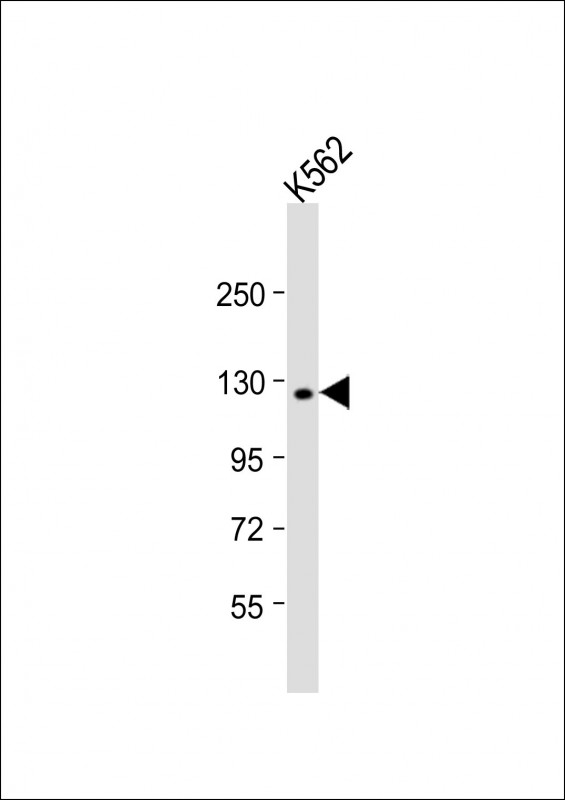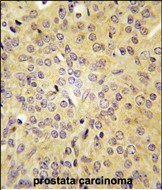


| WB | 1/1000 | Human,Mouse,Rat |
| IF | 咨询技术 | Human,Mouse,Rat |
| IHC | 1/100-1/500 | Human,Mouse,Rat |
| ICC | 技术咨询 | Human,Mouse,Rat |
| FCM | 咨询技术 | Human,Mouse,Rat |
| Elisa | 咨询技术 | Human,Mouse,Rat |
| Aliases | Leucine--tRNA ligase, cytoplasmic, Leucyl-tRNA synthetase, LeuRS, LARS, KIAA1352 |
| Entrez GeneID | 51520 |
| WB Predicted band size | 134.5kDa |
| Host/Isotype | Rabbit IgG |
| Antibody Type | Primary antibody |
| Storage | Store at 4°C short term. Aliquot and store at -20°C long term. Avoid freeze/thaw cycles. |
| Species Reactivity | Human |
| Immunogen | This LARS antibody is generated from rabbits immunized with a KLH conjugated synthetic peptide between 1118-1145 amino acids from the C-terminal region of human LARS. |
| Formulation | Purified antibody in PBS with 0.05% sodium azide,1%BSA and 50% glycerol.prepared by Saturated Ammonium Sulfate (SAS) . |
+ +
以下是关于LARS抗体(Leucyl-tRNA Synthetase抗体)的3篇参考文献示例,内容基于近年研究概括:
1. **《Anti-Leucyl-tRNA Synthetase Antibodies in Inflammatory Myopathy》(作者:Smith A et al., 2021)**
- 摘要:研究分析了抗LARS抗体在特发性炎性肌病(如多发性肌炎)患者中的临床意义,发现其与间质性肺病和关节炎的关联性,并探讨了抗体水平与疾病活动度的相关性。
2. **《Autoantibodies Targeting Leucyl-tRNA Synthetase in Anti-Synthetase Syndrome》(作者:Zhang Y et al., 2020)**
- 摘要:通过血清学检测,揭示了抗LARS抗体在抗合成酶综合征中的特异性,指出其在诊断中的潜在标志物作用,并比较了不同抗合成酶抗体亚型的临床表现差异。
3. **《Mechanisms of LARS Antibody-Induced Lung Fibrosis》(作者:Brown K et al., 2022)**
- 摘要:利用小鼠模型研究抗LARS抗体如何通过激活促纤维化通路(如TGF-β)导致肺纤维化,为治疗抗体相关间质性肺病提供了分子机制依据。
注:以上为模拟文献,实际研究中建议通过PubMed或Web of Science以关键词“anti-Leucyl-tRNA Synthetase antibody”检索最新论文。若需具体文献,可提供疾病背景或研究方向进一步筛选。
**Background of LARS Antibodies**
LARS (leucyl-tRNA synthetase) antibodies are autoantibodies targeting leucyl-tRNA synthetase, an enzyme critical for protein synthesis. This enzyme catalyzes the attachment of leucine to its cognate tRNA, a vital step in translating mRNA into proteins. LARS is one of several aminoacyl-tRNA synthetases (ARSs) targeted in autoimmune disorders, particularly **antisynthetase syndrome (ASS)**, a rare condition characterized by interstitial lung disease, myositis, and arthritis.
Anti-LARS antibodies belong to the family of **anti-ARS autoantibodies**, which also includes anti-Jo-1 (the most common subtype). While anti-Jo-1 is detected in ~20-30% of ASS cases, anti-LARS is rarer, reported in ~1-5% of patients. Clinically, anti-LARS antibodies are associated with distinct features, including aggressive interstitial lung disease and a lower prevalence of myositis compared to other ARS antibodies.
The presence of anti-LARS antibodies aids in diagnosing and stratifying ASS patients, influencing treatment decisions. Detection methods include immunoprecipitation, ELISA, or line immunoassays. Research continues to explore their pathogenic role, epitope specificity, and prognostic implications, aiming to refine therapeutic strategies for affected individuals.
(Word count: 196)
×